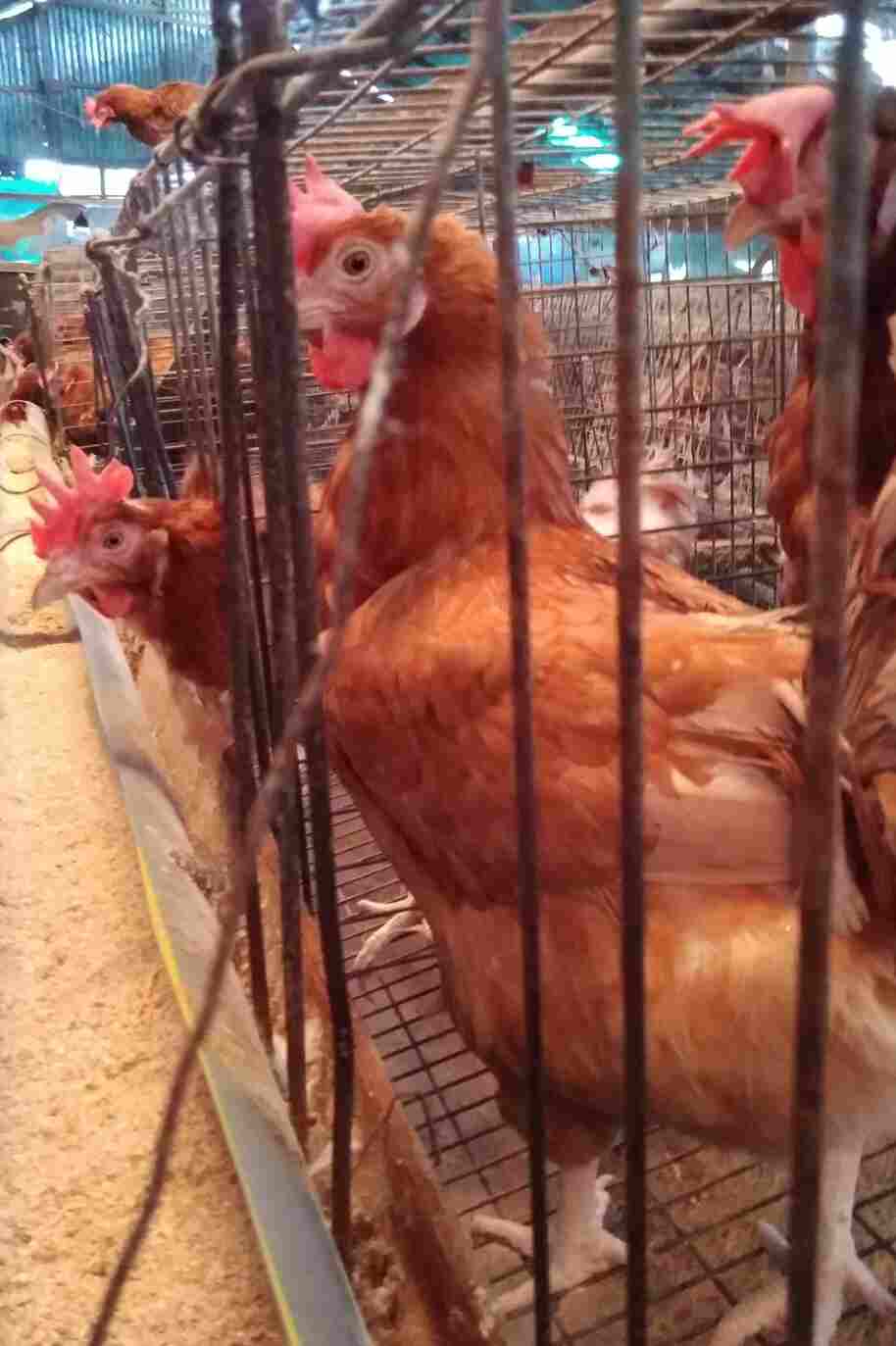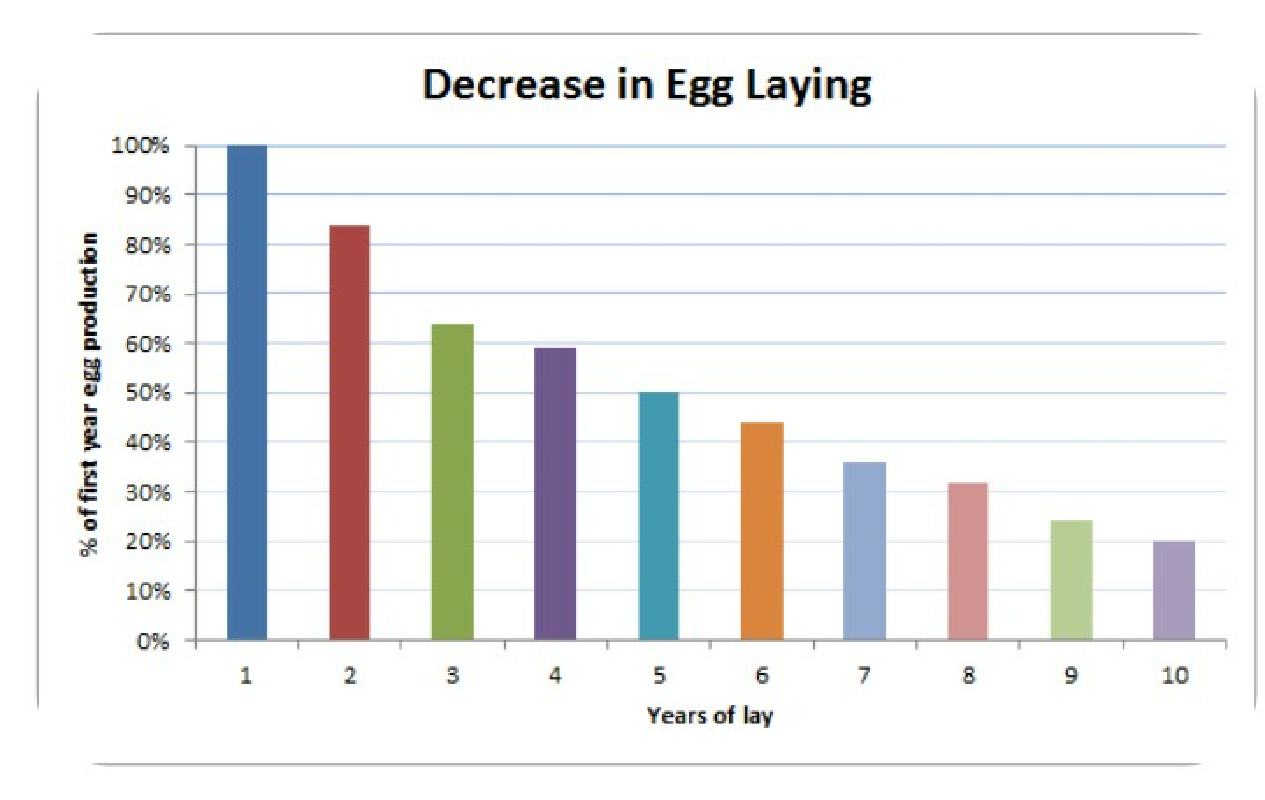There are several reasons why your chickens are not laying eggs again. Sometimes, they might have gone through stress, health challenges, nutritional problem, molting, lighting issues, etc. However, some of these problems are natural why some are not, but with good management practices this problem can be rectified and your chickens will start laying again.

Isa brown layers
Photo from Holychild Sec, Sch, Isuofia
If you are a poultry farmer or just a backyard chicken keeper, you may have noticed a sudden drop in egg production in your flock and you get worried, however, this is not the time to panic because you might take a wrong decision along the process.
There are some questions you have to answer before taking any action. Answering those questions will enable you to make an informed decision.
SO, if your chickens (hens) stop laying eggs you can identify and find out the reasons by asking the following questions:
1. Molting issue: Have the hens been laying for 10 months or more?
Your hens are probably approaching their end of the laying cycle... If that is the case, they will stop laying, go through a molt ( loss of feathers), have some rest, and start laying again.
The period of molting varies depending on the chicken breed. For backyard chickens, it takes about 8 to 12 weeks and can cause a sharp drop in egg production.
Besides the chicken breed, other factors determine how long a chicken will molt. Age, nutrition, and the environment all contribute to how long a chicken will molt.
What to do during molting
- Feed your chickens a high protein diet to help them with feather regrowth. One cheap way to do this is to process the feathers and feed it to them. Feathers contain 80-85 percent protein.
- Once you notice molting in your chicken you should switch to a complete feed with 20% protein, prebiotics, probiotics, and essential vitamins and mineral.
- Keep your molting chickens comfortable and stress-free. Everybody deserves a comfortable environment during vacation including your chickens.
- While switching from layers feed to the high protein feed, you should mix both gradually as you change over to avoid digestive upset and shock.
Note: If your chickens have been laying for less than 10 months, something else may be responsible for the lack of production. This will lead us to the next question.
2. Feeding problem: Are your chicken eating enough of the right feed (balanced diet)?
The quantity and quality of feed you give to your laying birds will have a huge impact on their egg production.
To eliminate feed as a possible reason why your chickens stop laying, you have to ensure your feed is of high quality and the hens are given the required daily amount at every stage of their life.
However, we may be overwhelmed by the high cost of feed, which may cause us to cut corners by supplement their feed with low-quality grains. But in most cases, we end up incurring more losses than expected.
If you are formulating your own feed, care should be taken in selecting the right feed ingredients that are palatable. These feed ingredients should be mixed in the right proportion to form a balanced diet for your birds.
Any compromise on feed quality and quantity will surely have an adverse effect on egg production.
If you are sure of your feed quality, the next question should be...
Also read: Alternative Poultry Feed Ingredients: A Solution to high feed Prices?
3. Water issue: Are the chickens drinking enough fresh, clean water?
Your hens will not eat if they cannot drink, so ensure that your watering system is functioning well. Water is the most essential feed ingredient, dot joke with water on your farm.
I can recall an incident on our school farm when one of the students forgot to put on the water system for one unit cage containing about 90 birds, about 70% of the birds didn’t lay that day. It took about 3 days for the whole bird to recover from the stress and start laying again.
In addition, keep the water cool as much as possible, although, keeping water cool at extreme temperatures can be very challenging during the cold or hot weather.
During the cold weather (winter) you can buy drinkers that have heaters attached to keep the water from freezing, while in hot weather (summer) you can store your overhead tanks in a cool place and add some ice cubes in them to keep the water cool.
The issue of constant fresh clean water cannot be over-emphasized when it comes to egg production.
For 90% production, 1000 laying chickens should consume 270 liters of water per day. Refer to this article on the water requirement of poultry.
Also read: How to Make Chicken Lay Big Eggs and Make More Profit
4. Light issue: Are the hen getting enough hours of light per day?
Research has shown that the intensity and duration of light have a huge impact on laying birds. An increase in light duration helps to stimulate egg laying in birds while a decrease in light hours reduces egg production. The appropriate light hour is 16 to 18 hours per day for laying birds.
Therefore, it is important that your birds are getting the required light hours per day, even when the daylight is shorter, especially during the winter or fall.
During this period you should ensure to provide supplement light or else your birds may go out of production. You can put on the light before the day breaks in order to meet up the needed daily light hours.
.png)
5. Parasites Problem: Do the hens have parasites?
Several internal parasites and external parasites infest your hens and stress them. The common internal parasites that affect chickens are worms and protozoa, while external parasites are mites and lice.
Serious infestations of internal parasites can distort and damage the digestive tract and reduce hen performance. While heavy infestations of mites can cause anemia in hens, which adversely affect performance.
Ensure you deworm your hens regularly and disinfect every nook and crack in your chicken coop or pen.
6. Have there been any health issues within the flock?
A flock that has been ill or sick will definitely not perform well, same with a flock that has gone through a disease challenge. So, make sure your flock is well and hearty through proper medication and welfare.
7. Old Age: How old are your Hens?
For instance, you have a Rhode Island Red, that should be laying more than 200 eggs per year, gradually, you notice a drop in egg production.
However, as hens get old, the number of eggs they lay decreases. Take a look at the graph below, and you can see you normally get around 3 years of good egg-laying from a hen.
Image graph

Source:thehappychickencoop.com
Other reasons why your birds are not laying
The above reasons are not only the actual reasons your hens stop laying eggs, you assume they might not be the cause then you need to look outside the picture. The below reasons can also cause your hens to stop laying eggs.
Someone/something is Eating or Stealing the Eggs
Sometimes your hen may be laying eggs normally, but someone may get to them before you, especially if you have workers on your farm. While it is possible to suspect a human egg thief, it is also possible it could be an animal or even one of the chickens eating the eggs.
Extreme Weather Condition
Extreme weather is also another potential factor that could stop your hens from laying eggs. Be it extremely hot or extremely cold, you could notice a drop in egg production. Luckily, this is easy to over as I described above in question 3 by using drinkers with a heater and adding ice in water during hot and cold weather respectively.
You can also adjust the ventilation accordingly during these extreme weathers.
Conclusion
So, before you take any action you should at least answer the above questions we have treated to avoid taking the wrong decision or action.
Ensure you give your hens the best management practices and welfare by inspecting their feeding, lighting, airflow/ventilation, water, and bio-security/sanitation. Doing this will guarantee you a healthy and productive hen.
FAQs
How to get chickens to lay eggs again?
If your chickens are not laying again eggs, the first thing to do is to ensure your flock is in a good condition by answering some specific questions concerning the standard of their feed, lighting, water, ventilation, sanitation, age, and finally their health condition. If you find out any abnormality after your inspection try to fix it or you invite an expert to help you out if it requires technicality.
How Do I Encourage My Chickens To Lay Eggs?
You can encourage your chickens to lay eggs by providing enough space and cozy nest boxes for them and regularly pick the eggs. If you don’t pick the eggs some will go broody, and as you know a broody hen does not lay eggs.
How Many Days Can a Chicken go Without Laying an Egg?
Naturally, a chicken ceases laying eggs if the hen is molting or brooding. Molting can take up to 8 to 16 weeks depending on the breed and other factors, while a hen can brood to about 21 days.
What do you do if your chickens aren’t laying eggs?
If your chickens are not laying or stop laying eggs probably due to old age, you can keep the chicken as a pet or use it for meat.
Why do chickens stop laying eggs in winter?
The reason why chickens stop laying eggs in winter is that chickens do not lay eggs in extreme weather like the winter period, which is extremely cold. To control it, you should use a drinker with a heater to help keep the water warm. Then use a lot of beddings on the floor to isolate them from cold.
Why are my chickens not laying eggs in the summer?
The reason why chickens do not lay eggs in summer is that the summer period is characterized by hot weather, and hot weather can cause stress in chickens which may cause them not to lay.
Try adjusting the vent and give them a lot of cold clean water. You can add ice to their water and give them some cold fruit during this period.
If you have a laying flock, you can share with us your experience on the number of eggs you get.
If you find this post helpful, please, comment and share
.
Need a website or other IT services? Visit our website!
Share on Twitter Share on Facebook
Comments
Comment awaiting approval 2 years, 9 months ago
New Comment